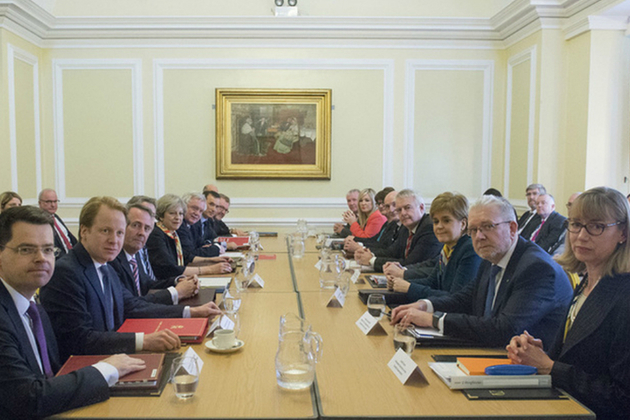By Paul Anderson and Soeren Keil
The wait is finally over. The Supreme Court ruled on 24 January 2017 that ‘by a majority of eight to three … [the] government cannot trigger Article 50 without an Act of Parliament to do so’. Theresa May and ‘Team Brexit’, unsurprisingly, expressed their dismay and disappointment in the decision. Despite much of the hype surrounding the legal implications of the decision (remember when The Daily Mail labelled the judges of the High Court as ‘enemies of the people’), one thing remains certain: the UK will withdraw from the European Union. What is not clear, however, is whether the Supreme Court’s decision will delay the triggering of Article 50, how much opposition will ensue in the immanent debates in Westminster and whether opposition parties will be able to dilute the ‘Hard Brexit’ position through a cascade of amendments. The decision indisputably has significant legal ramifications, but the effect of this landmark ruling on the UK’s constitutional edifice cannot be understated.
As well as ruling that Article 50 must be triggered by an Act of Parliament, the Supreme Court also dismissed the need for the British Government to seek the legal consent of the devolved legislatures. This is, of course, much to the chagrin of the Scottish, Welsh and Northern Irish governments and will no doubt further strain the tenuous relationships between the British government and its devolved counterparts. The Brexit debate has firmly moved from the legal arena back to the political realm.
Although the Westminster Parliament is no longer alone in her own State, she remains the most powerful legislature in the UK. Despite the rolling programme of devolution in the late 1990s, the Westminster Parliament has not, in theory, relinquished any of its sovereign power. It has merely authorised the devolved legislatures to enact laws on a limited number of matters. As Enoch Powell infamously remarked, ‘power devolved is power retained’. The establishment of the Sewel Convention, however, ‘limits’ the possibility of Westminster interference in devolved affairs. The convention states that the UK parliament will not normally legislate on devolved matters or indeed on matters which affect the legal powers of the devolved parliaments without the consent of the legislature involved. The decision to withdraw from the EU has brought the issue of the Convention back into play. According to the Scottish Government, leaving the EU will explicitly affect devolved policies – such as agriculture. It is necessary, they argue, that the devolved legislatures be officially consulted – as the Sewel Convention attests – before the triggering of Article 50 takes place. Failure to do so, according to Nicola Sturgeon, ‘not only undermines the Sewel Convention’ but demonstrates that both the Convention itself as well as promises to embed it in Statute ‘were not worth the paper they were written on’.
While the Supreme Court’s decision rules out any legal obligation to consult the devolved legislatures on Brexit, the fact that the UK is a multinational state means that there is a political obligation to do so. Pursuing an agreed approach to the issue of Brexit, that is, one that has the support of the all devolved nations, is of crucial importance to impede the constitutional crises that look set to unfold should the British Government impose a Brexit strategy on the devolved administrations. This would be an unequivocally irresponsible and reckless move that could potentially embolden the claims of separatists in Scotland.
What is more, while the majority of MPs backed Theresa May’s “Withdrawal from the European Union (Article 50) Bill” on the 1st of February 2017 (with a vote of 498 for and 114 against), the White Paper published the following day did not clarify many of the issues previously raised. While it highlights the UK’s aim to reach a positive agreement with the rest of the EU in the departure negotiations, it does not address fundamental questions about the UK’s internal structure. It does not elaborate on the position of the devolved nations in the negotiations and their involvement, and it does not give the option for any of the Home Nations to reach alternative agreements with the EU, an option also suggested by leading Scottish Nationalist Party officials. Although, as has been pointed out elsewhere, a special deal for Scotland is unlikely.
What this means is that while the Supreme Court has confirmed that the UK remains a Parliamentary Democracy (and Theresa May cannot rule by decree as is currently done by the President of the USA, who seems to have forgotten about the division of powers), the ruling did not contribute to overcoming or halting the emerging constitutional crisis. As we have argued previously, with Theresa May pushing for a “Hard Brexit” i.e. departure from the Single European Market, this will antagonise and push the Scottish leadership to seriously consider their chances in a second independence referendum. Should the effects of the Brexit vote and the negotiations begin to demonstrate negative economic, social and political consequences for the UK in general, and for Scotland in particular, then there is a good chance that the SNP and its allies might just win a second independence referendum. In which case Theresa May will be responsible not only for withdrawing the UK from the EU, but moreover, as the prime minister who destroyed the Union.
 Politics
Politics Anna Vanaga
Anna Vanaga 661
661


